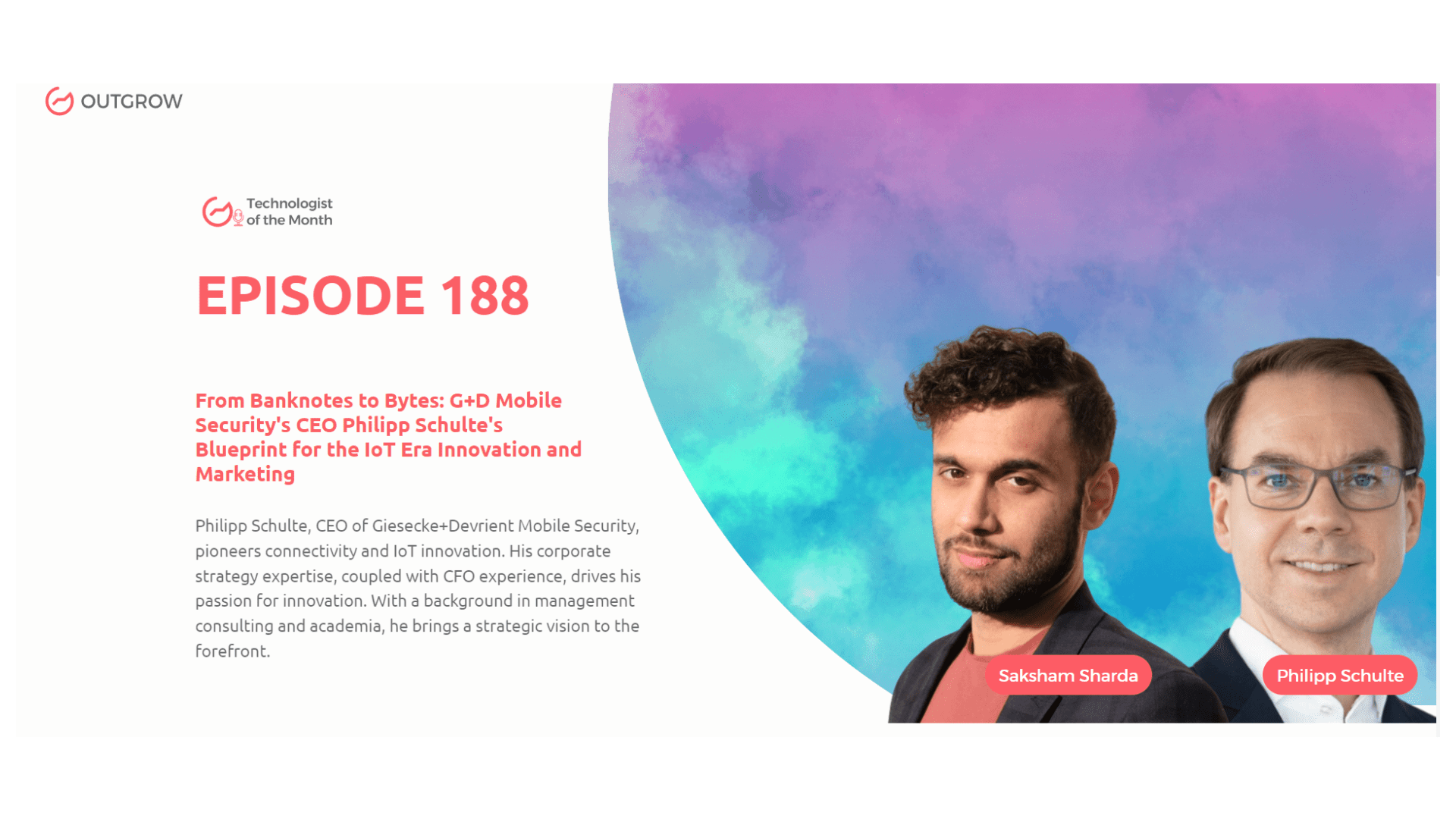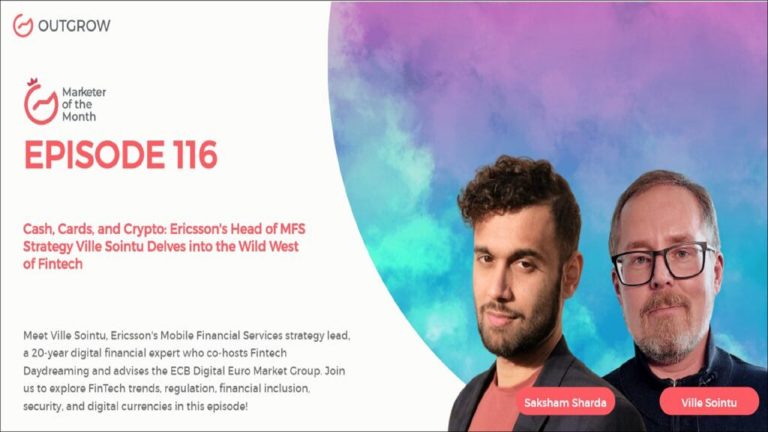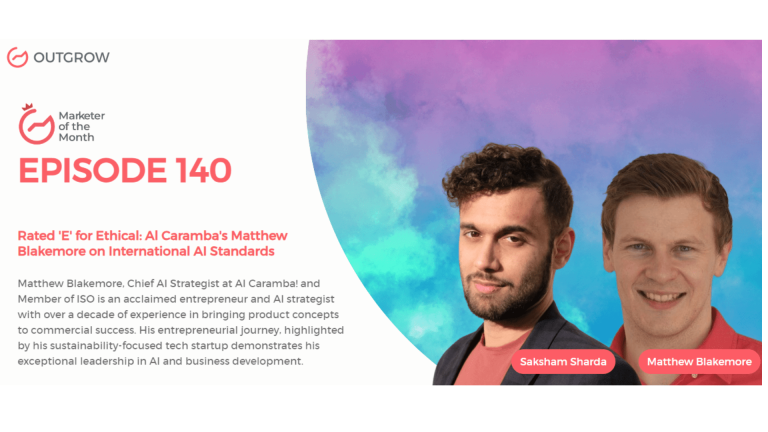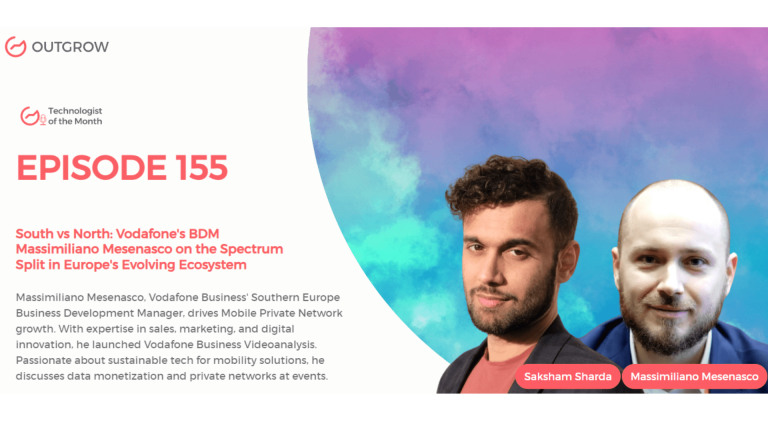EPISODE 188: Marketer of the Month Podcast with Philipp Schulte
Table of Contents
Hey there! Welcome to the Marketer Of The Month blog!
We recently interviewed Philipp Schulte for our monthly podcast – ‘Marketer of the Month’! We had some amazing insightful conversations with Philipp and here’s what we discussed about –
1. IoT provides secure technology for critical infrastructures, ensuring reliable data transmission and security benefits.
2. Investments in transportation, logistics, and tracking solutions optimizing supply chains, and enhancing environmental control.
3. Efficiency and waste reduction, such as eliminating plastic SIM cards, lead to CO2 footprint advantages.
4. Reducing complexity and ensuring interoperability is crucial for IoT’s full growth potential.
5. Importance of balancing regulatory changes like the AI Act and Cyber Resilience Act to foster a healthy IoT ecosystem.
6. Security is built into all layers, including chips, operating systems, encryption technology, and data management.
About our host:
Dr. Saksham Sharda is the Chief Information Officer at Outgrow.co. He specializes in data collection, analysis, filtering, and transfer by means of widgets and applets. Interactive, cultural, and trending widgets designed by him have been featured on TrendHunter, Alibaba, ProductHunt, New York Marketing Association, FactoryBerlin, Digimarcon Silicon Valley, and at The European Affiliate Summit.
About our guest:
Philipp Schulte, CEO of Giesecke+Devrient Mobile Security, pioneers connectivity and IoT innovation. His corporate strategy expertise, coupled with CFO experience, drives his passion for innovation. With a background in management consulting and academia, he brings a strategic vision to the forefront.
From Banknotes to Bytes: G+D Mobile Security’s CEO Philipp Schulte’s Blueprint for the IoT Era Innovation and Marketing
The Intro!
Saksham Sharda: Hi, everyone. Welcome to another episode of Outgrow’s Marketer of the Month. I’m your host, Dr. Saksham Sharda, and I’m the creative director at Outgrow. co. And for this month we are going to interview Philipp Schulte, CEO of Giesecke+Devrient, Mobile Security
Philipp Schulte: Great to be here. Thank you.
Don’t have time to read? No problem, just watch the Podcast!
Or you can just listen to it on Spotify!
The Rapid Fire Round!
Saksham Sharda: All right, so let’s start with the rapid-fire round just to break the ice. The first one is, at what age do you want to retire?
Philipp Schulte: At an age where I’m still able to read because that’s my ultimate dream that I’d just sit in an armchair and read all the books that I never find the time to do.
Saksham Sharda: Okay, we just step back like three steps?
Philipp Schulte: Three steps.
Saksham Sharda: Yes. That’s good. Thank you. Alright, so the second one is, how long does it take you to get ready in the mornings?
Philipp Schulte: Roughly 30 minutes for myself. 30 minutes for my kids.
Saksham Sharda: Favorite color?
Philipp Schulte: Blue.
Saksham Sharda: What time of day are you most inspired?
Philipp Schulte: Probably the best thoughts I have during nighttime.
Saksham Sharda: How many hours of sleep can you survive on?
Philipp Schulte: Two nights with five hours is okay. After that it becomes tough.
Saksham Sharda: Fill in the blank. An upcoming technology trend is _____. Or an upcoming marketing trend is blank. You can choose.
Philipp Schulte: The upcoming technology trend is augmented reality.
Saksham Sharda: The city in which the best kiss of your life happened.
Philipp Schulte: That for sure has to be in Bavaria where I kissed my wife.
Saksham Sharda: Okay. Pick one. Elon Musk or Mark Zuckerberg?
Philipp Schulte: Steve was there.
Saksham Sharda: How do you relax?
Philipp Schulte: By reading.
Saksham Sharda: How many cups of coffee do you drink per day?
Philipp Schulte: Probably too many. I would say five.
Saksham Sharda: A habit of yours that you hate.
Philipp Schulte: How to learn new things.
Saksham Sharda: Your favorite Netflix show.
Philipp Schulte: Money Heist.
Saksham Sharda: One-word description of your leadership style.
Philipp Schulte: Encouraging.
Saksham Sharda: Top priority in your daily schedule.
Philipp Schulte: Survive.
Saksham Sharda: Ideal vacation spot for relaxation.
Philipp Schulte: A warm sunny beach.
Saksham Sharda: Key factor for maintaining a work-life balance.
Philipp Schulte: Try not to go hard. Sometimes accepting that we have to make compromises on either side.
The Big Questions!
Saksham Sharda: Okay, well that’s the end of the rapid fire. Let’s go into the longer questions. Where did G+D originate from and how does it position itself in the IoT market?
Philipp Schulte: So how do you come from bank node printing to IoT? That’s the story of G+D. It was founded 170 years ago in eastern Germany. Nowadays headquartered in Munich. We originated in the bank court industry and we have been doing that ever since. But over time the decades and centuries we have innovated and evolved in many different aspects as well. And nowadays we are very present in digital security also IT space financial platforms and currency technology.
Saksham Sharda: So what’s so exciting about this space now compared to the other spaces that you’ve been in, historically?
Philipp Schulte: What fascinates me is really that we are working in very critical infrastructures, right? We provide security technology that is then ultimately reliable so that all of our customers can work with that and enjoy the security benefits that come on.
Saksham Sharda: So how would you, in your terms define the IOT and its impact on society?
Philipp Schulte: IoT is ultimately about connecting everything that runs on power and that is our ultimate goal to first have that secure connectivity, but also then ensure that we can have reliable data transmission from one device to the other one. And that will provide a lot of economic, environmental, and societal benefits.
Saksham Sharda: And so in what ways do you foresee IoT revolutionizing industries beyond technology? So for instance, healthcare, transportation, agriculture, or any other industry that comes to mind?
Philipp Schulte: Transportation is a good keyword because we are investing heavily in that space. And so last year we acquired a company that was providing IOT tracking solutions to optimize supply chains in transport and logistics. The ability to track where you are moving goods at any point in time and get all the kinds of environmental parameters under your control, by itself is very valuable.
Saksham Sharda: So you talked about the environment. So in what manner will the IOT address these global challenges like climate change, hunger, and health?
Philipp Schulte: Well, you cannot solve everything. I hope that’s clear. But if we get more efficiency in a lot of our day-to-day processes, if we require less material to be moved around if we produce less waste all of that has a very clear impact on on environmental standards and ultimately then also like climate change.
Saksham Sharda: So you’d say efficiency is a key parameter of IoT?
Philipp Schulte: It’s one of the most prominent benefits. I would say yes. It’s also a reduction of waste, right? I mean we are very heavily invested in, which is the success of the physical plastic SIM card. And here we are getting rid of all the plastic around that. And that has 42% CO2 footprint advantage over web plastic.
Saksham Sharda: So you said you’re involved worldwide now, so how does G+D tackle global connectivity gaps to ensure continuous device connectivity worldwide?
Philipp Schulte: Yes, also here we have done some investments. We acquired a so-called MBNO, a mobile virtual network operator who is active in most of the countries around the planet. And that means by having that and our security technology, we can ensure that the device wherever it’s being turned on, can securely connect to any network out there.
Saksham Sharda: And so what about diverse geographical regions where connectivity is hard? Are there any challenges you’re facing or any improvements you’re making there?
Philipp Schulte: The big thing of course, beyond cellular connectivity, is also then connectivity via satellite, right? So here we are already in partnerships with a couple of active companies in that sphere. It can be a very good combination that you have reliable cellular connectivity wherever that is available. But roughly 90% of the world’s landmarks, no, the world are not covered by cellular connectivity. So that’s actually where satellites can play a very important role.
Saksham Sharda: So, taking a break from these questions, we are gonna ask you a question. What does your typical day look like? You wake up in the morning and what is your business day like?
Philipp Schulte: I’m not sure there is something like a typical day because it can be very different. Whether it’s a day in the office or whether it’s a day being at a convention like here in Barcelona last week I was at another convention in Stockholm for example. But usually, what I do, I try to get up very early in the morning get myself ready, help to make breakfast for my kids, set them off to school, then drive to the office, and then it’s very much packed with meetings, right? Ultimately that’s my job to to be in discussion with people, try to make decisions get approvals, and steer the business.
Saksham Sharda: So which other conventions do you go to besides Mobile World Congress?
Philipp Schulte: So I was on the consumer electronic show in Las Vegas at the beginning of the year. Great. Starting the year. Last week was actually in Stockholm, the tech arena, which was very exciting. And usually, we try to have some kind of schedule around the year of the things where mostly we can also meet customers. That’s what’s driving me.
Saksham Sharda: So keeping all the different sectors that you’ve talked about and the different events that you’ve been to, what do you think is overall necessary for the IoT to achieve its full growth potential?
Philipp Schulte: For me, it’s about the reduction of complexity and ensuring interoperability. There are other many we are talking about billions of different devices with different manufacturers and we find good mechanisms to ensure that they all can speak to each other and that we get the value out of it.
Saksham Sharda: And are there any specific regulatory or policy changes you believe are crucial to fostering this growth of the IoT industry?
Philipp Schulte: Well, we are looking at a couple of regulatory changes, for example, when it comes to the AI act that is being discussed in Europe when you’re talking about the Cyber Resilience Act. So all of these can be very important ingredients now the rot to ensure that we have a healthy ecosystem. What is always important is that the regulation does not interfere with innovation too much have to balance it.
Saksham Sharda: So how does G+D contribute to IoT growth and address associated challenges?
Philipp Schulte: Well, we provide key ingredients when it comes to security technology to have secure network authentications. We’ve been doing this for more than 30 years, and we are, I believe, a well-known trusted partner in the ecosystem.
Saksham Sharda: So can you outline some of the key contributions G+D has made to the advancement of IoT technology and how it navigates challenges in this dynamic market?
Philipp Schulte: Yeah, for sure. It is a dynamic market. One of the things that we are influencing this, of course via the normal standardization bodies, right? Of course. We play an active role in shaping industry standards like the recent STP 32 that was published. We had our contributions into that one as well, but ultimately is more about providing secure technology to our customers that is secure against attacks. And that will create confidence in the whole system.
Saksham Sharda: So what is the business case would you say, in general for IoT adoption amongst these customers that you’re talking about? And how does G+D assist them in achieving it?
Philipp Schulte: Well, I wouldn’t say there’s like this one business case. You have to look at that depending on the specific use case, depending on the specific industry vertical that you are then targeting to come back to what we mentioned before on the transport and logistics side, right? If you can allow the logistics company to have 5% less waste in their supply chain needing fewer containers, for example, to ship all their goods because, at any point in time, you know exactly where all the other 95% of containers are and where they will arrive at the next destination. That is the real value that pays by itself.
Saksham Sharda: And in what ways does G+D support its customers in overcoming obstacles commonly associated with IoT deployments such as security concerns or interoperability issues?
Philipp Schulte: So yes, for sure it’s about security that we provide. For example, the secure operating systems, and the secure profile generation that is personalized for each customer or each device. And for sure it’s about taking complexity, right? It’s that we have packaged solutions that provide you with global connectivity out of the box no matter where you are.
Saksham Sharda: Could you comment a bit on the relationship between IoT and AI? Since everyone is talking about AI all the time.
Philipp Schulte: It can be very interesting, but some of these megatrends, converge or they have a certain crossroad. For sure AI provides potentially great analytical capabilities, right? That can then help to build on connected devices and to make maybe some of the efficiency gains even higher. That’s why I see where AI can for sure fit for the role.
Saksham Sharda: Are there any specific use cases where the synergy between IOT and AI has resulted in transformative outcomes or innovative solutions?
Philipp Schulte: I think that is yet to come because ultimately what we are discussing now is a big breakthrough in AI is more the generative AI part. There I don’t see that much connection to what we’re doing with it in general. But what will happen of course is that there will be many more implications than for a hybrid. So far we don’t yet foresee.
Saksham Sharda: So given the vast number of connected devices globally, how does G+D ensure the security of the IoT ecosystem?
Philipp Schulte: It is about having security on all different layers, right? So it starts with the silicon. There are chips where we are working closely with a lot of partners in the semicon industry. It goes over that to the operating system that we can reliably program on all different platforms. It is about encryption technology that we have been developing for many years. Nowadays it’s about the management of data in a secure fashion. So really you have to have security built in on all different layers. Then you have security in depth.
Saksham Sharda: What is your vision for the future of IoT and how do you anticipate its evolution?
Philipp Schulte: At some point in the future we believe that every device that runs on power will have a good and connected, and it’ll just be normal that you have that as a package altogether and that you can remotely connect to every device. And that’s also a security benefit because that allows you not just to get data and information out of their devices, but it’s also about the ability to update devices in the field. Right. And that is also a security concern.
Saksham Sharda: So your upcoming session at the 5G IoT Summit sounds intriguing. Could you share a brief overview of what attendees can expect to learn from your session on mastering the IoT puzzle and securing seamless connectivity?
Philipp Schulte: Well, we want everybody to come to the session. But it’s about putting together different puzzle pieces that we believe we have in place which again, then takes the complexity out and ultimately builds better use cases for our customers.
Saksham Sharda: How do you anticipate satellite connectivity will revolutionize IoT applications in this regard?
Philipp Schulte: I think it’s a great addition because by having a seamless handover between cellular connectivity and satellite connectivity, you cover pretty much all of the environment. And then the third issue to that one would be technology that allows you to track devices inside of buildings where maybe you don’t have satellite or cellular connectivity.
Saksham Sharda: So you posted at the start of February on LinkedIn the importance of standing up for values and diversity within organizations. How does G+D mobile security promote diversity and inclusion and what benefits have you observed as a result?
Philipp Schulte: Well, it was personally for me, very important to take a very clear position, right? Because we see many parts of the world where sometimes hate messages take over, we see people working against each other. And for me, it was very important that we send a clear message that this is not acceptable, not in our society, not within G+D. So we want to make sure that everybody feels included no matter what their ethical background is, no matter what gender they have, no matter what sex orientation they have. We want to be a diverse workplace and I think we have a good workplace.
Saksham Sharda: And how do you ensure that diversity and inclusion efforts are integrated into the company’s broader strategy and culture?
Philipp Schulte: Well, we make sure that actually we live up to these values, right? Whenever we see something that is not quite right, we try to address it immediately and then actually also reinforce, and reemphasize the message that such behaviors are not acceptable. And also we try to live by example. We also want to make sure that every voice is heard. To give you a very specific example, just a few weeks ago we launched a new initiative in my division, which is called the 30 board, the under 30. And that is actually a new instrument where we are trying to collect, especially the voice of the younger generation and we want to make them more visible and get their feedback on some of the decisions and some of the initiatives that we’re taking.
Saksham Sharda: So let’s talk about your own background a bit. It has an extensive experience in strategy consulting with a focus on telecom, tech, and automotive industries. How has this background influenced your own diverse approach to leadership and decision-making at G+D mobile security?
Philipp Schulte: What I like to believe is that having a background, both in the engineering but also in the consulting and financial aspect allows me to have very different perspectives on top Commerce. And sometimes we need to have more combination of these different viewpoints to come to the best decision. What I picked up a lot in consulting is the fact that I like to dig deep into problems, try to analyze them, learn about them, and hopefully make the best proposal.
Saksham Sharda: Alright, so the last question for you is of a personal kind. What would you be doing in your life, if not this?
Philipp Schulte: Spend more time with your family.
Let’s Conclude!
Saksham Sharda: Thanks, everyone for joining us for this month’s episode of Outgrow’s Marketer of the Month. That was Philipp Schulte, CEO of Giesecke+Devrient, Mobile Security.
Philipp Schulte: Pleasure. Thanks for having me.
Saksham Sharda: Check out the website for more details and we’ll see you once again next month with another marketer of the month.

Muskan is a Marketing Analyst at Outgrow. She is working on multiple areas of marketing. On her days off though, she loves exploring new cafes, drinking coffee, and catching up with friends.








